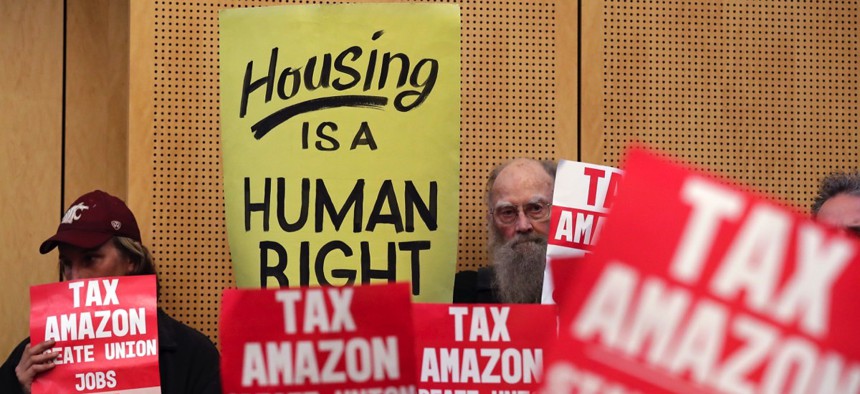NLC Targets Political Opposition to Federal Housing Assistance by Joining Campaign

Members of the public look on at a Seattle City Council meeting before it voted in May to approve a tax on large businesses such as Amazon and Starbucks to fight homelessness. Elaine Thompson / AP Photo

Connecting state and local government leaders
Opportunity Starts at Now is focused on the widening gap between rent and income across the U.S.
The National League of Cities is joining the steering committee for the new Opportunity Starts at Home campaign, which advocates for federal solutions to the U.S. housing affordability crisis.
Expanding availability of safe, affordable housing and providing rental assistance to low-income, vulnerable communities are among the organizations’ shared goals.
With its addition to the committee, NLC plans to address the increasing gap between rents and incomes across the country amid what the group calls “growing political opposition and attacks” on federal housing assistance funding, which low-income households rely on.
“We’re always asking the federal government for more certainty,” Mike Wallace, housing and community development program director at NLC, told Route Fifty. “It’s not that much different for families trying to climb up the economic ladder.”
For them, a home means the stability to find a job or a better job and address other needs like child care, he added.
Opportunity Starts at Home will explore policies palatable to both Democrats and Republicans coming out of the midterm election, Wallace said, as well as for every kind of city: small, midsize or large.
“America’s housing crisis is worsening as housing prices continue to rise while wages stay flat,” said Little Rock, Arkansas Mayor Mark Stodola, who serves as NLC president, in a statement. “Research has shown that there’s not a single city, county or state where a worker earning minimum wage can afford a two-bedroom rental by working a standard 40-hour week.”
The National Low Income Housing Coalition study Stodola referenced also found only 22 counties where full-time, minimum wage workers could afford a one-bedroom rental without spending more than 30 percent of their income. All were in states with minimum wages greater than the federal rate of $7.25 an hour.
NLC joins NLIHC, the Children’s Defense Fund, the National Education Association, the National Association for the Advancement of Colored People, and the National Alliance on Mental Illness on the steering committee.
“When people lack access to decent affordable housing, it negatively impacts their health outcomes, educational attainment, and ability to climb the economic ladder,” said Mike Koprowski, national director of Opportunity Starts at Home, in last week’s announcement. “That’s why leaders from a range of sectors—from healthcare to education to civil rights—are coming together to build a broad movement to make affordable homes a top national priority.”
Housing affordability, supply and homelessness are top priorities for cities in every population category above 50,000, according to NLC data.
In May, NLC’s Mayors & CEOs for Housing Investment coalition secured a $200 million investment from Kaiser Permanente in housing and homelessness prevention.
Republican-backed tax reform was a blow to affordable housing efforts, as the cut to the corporate tax rate makes low-income housing tax credits less valuable. NLC would like to see changes made to the Community Reinvestment Act, which encourages financial institutions to lend to low- and moderate-income households they otherwise might redline, to further reduce discrimination.
Reforms might include applying the law to all relevant lenders and not just traditional, deposit-taking banks; including internet lending in performance assessments, rather than just physical branches; and publishing community-development investment reports for transparency.
For fiscal year 2019, NLC is pushing to at least maintain Department of Housing and Urban Development funding at current levels.
“We would really like to see something that preserves the level of funding for housing programs because cities are still on incredibly long lists to receive subsidies for rental programs,” Wallace said. “HUD should be allocated more funding in the federal budget to help juice the economy and help families on public assistance become more economically self sufficient.”
Dave Nyczepir is a News Editor at Government Executive’s Route Fifty and is based in Washington, D.C.

NEXT STORY: In Texas, Armed ‘Marshals’ and ‘Guardians’ Stand Ready to Protect Students





